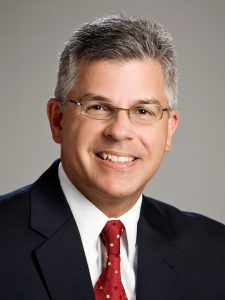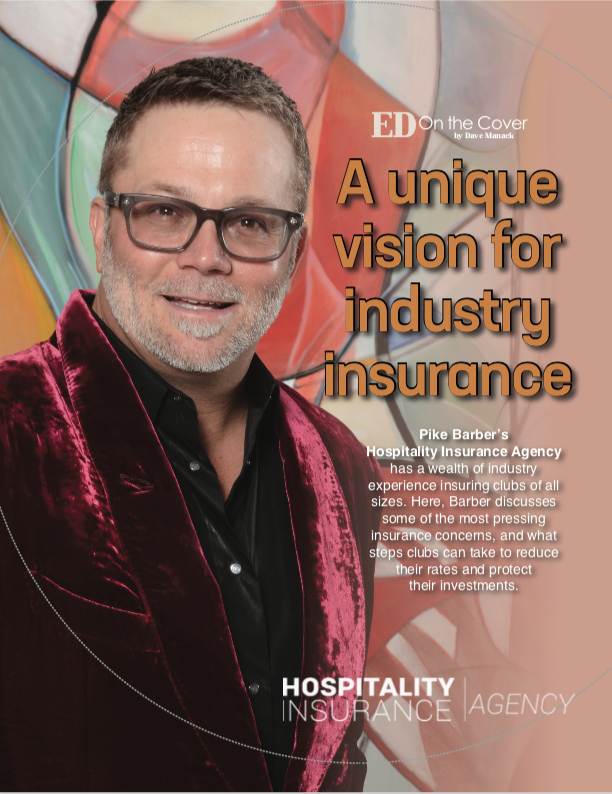(Note: This story appears in the September 2021 issue of ED Magazine)
Pike Barber’s Hospitality Insurance Agency has a wealth of industry experience insuring clubs of all sizes. Here, Barber discusses some of the most pressing insurance concerns, and what steps clubs can take to reduce their rates and protect their investments.
Insurance is all about minimizing risk and protecting your most valuable assets. In a time of such constant change, it makes sense to enlist the services of an established and industry-centric carrier who understands not only the “typical” insurance risks faced by club owners, but also hot-button areas of coverage like workers’ compensation and COVID-related exposure.
Hospitality Insurance Agency (HIA) has been serving the hospitality industry since 1948 — three years after the conclusion of WWII. Established by Pike Barber’s grandfather, HIA is headquartered in Florida, the largest hospitality state and is now led by Pike, a third-generation insurance professional.
ED Magazine spoke with Barber about the coverages HIA provides clubs, how club owners/operators can curb the cost of their policies through proactive measures, how to navigate the choppy waters of insurance amid employee/independent contractor classifications, and what COVID means for policies moving forward.
ED: How did you start working with the gentlemen’s club industry?
BARBER: In 2010, we opened and branded our Hospitality Insurance division and attended out first EXPO and Nightclub & Bar conventions, and we have never looked back. The hospitality industry comes with many challenges, and from the inherent nature of the business, we found as insurance professionals we have many products, services and solutions to help our insured hospitality clients protect their assets, customers and employees.
ED: What kinds of coverages do you specialize in providing?
BARBER: We have three insurance divisions. Our Barber Agency Personal Lines Division provides “personal” insurance: home, condo, flood, auto, collector auto, recreation vehicles, boat/jet ski, umbrella. Barber Agency General Commercial Division insures anything from A-Z, as it relates to any type of business. Of course, everyone in this industry knows us as Hospitality Insurance Agency (HIA), specializing in insuring anything hospitality with a very specific focus on providing coverages and services to the gentlemen’s club industry. Here are many of the industry-specific coverages that we offer: assault and battery without weapons and firearms exclusion; liquor liability; defense cost outside your limits; umbrella liability; media/cyber; workers’ compensation; employment practice liability insurance; active shooter/active assailant.
I can statistically prove the venues that have a true loss-control/risk-management program like the one we provide always outperform the venues that don’t from a standpoint of having fewer incidents, fewer and lower claims, and lower annual insurance premiums. — Pike Barber
ED: Why should clubs choose your company for their insurance needs?
BARBER: We are definitely one of the leading hospitality agencies in the country and recognized by our clients, carriers and industry as elite in this industry. We have millions in written premiums with the very best hospitality carriers in the nation that specifically provide coverages for adult/gentlemen’s club venues.

ED: Talk about your security training program, and how it can save club owners money on their policies.
BARBER: We provide a full loss-control and risk- management training program specifically designed for the gentlemen’s club industry through our partnership with Robert Smith and Manny Marquez of Nightclub Security Consultants. We offer all of the following training courses; upon successful completion of any of these training programs, we guarantee we will be able to offer you a savings on your liability and umbrella policies:
• National Host Security Certification Training – 12 hours
• CA Proprietary Security Office (PSO) Licensing Training -16 hours
• National Host Advance Training – 6 hours
• National Host Positive Outcome Response Training – 4 hours
• Active Shooter/Terrorism Awareness Training – 3.5 hours
• Host Security Management Training – 3 hours
• Host Report Writing and Documentation Training – 3 hours
• Host Responsible Alcoholic Service Training – 3.5 hours
I can statistically prove the venues that have a true loss- control/risk-management program like the one we provide always outperform the venues that don’t from a standpoint of having fewer incidents, fewer and lower claims, and lower annual insurance premiums. We 100% back up all of the above trainings to include a premium savings, and in doing so, we partner with our gentlemen’s club owners and co-op in sharing the cost of any of the above training year in and year out. We are proud to say that we are the agency that insures Miami’s E11EVEN; this group has completed 22 group training and 130 individual online national host trainings over the past six years and have been able to keep their overall loss ratio at 18%.
ED: What can you do for clubs who are having a high rate of security-related incidents and claims?
BARBER: If any clubs are having incident frequencies and claims problems, then they need to call us now. Please note we can only fix you if you want to be fixed; in doing so, we will need a firm commitment from the owners, managers and their security teams that they are committed to a change in culture and operations, with strict adherence to following the training and policy procedure manual.
At the end of the day, we truly care about educating and implementing true loss-control and risk-management programs for all of our clients. In this litigious society we live in, it’s not if a claim is going to happen, it’s definitely when the claim going to happen. When it does, we will be able to assist our clients that have completed the NSC training and their carriers in mitigating a much lower claim payout/judgment.
ED: Some clubs utilize third-party security companies for their clubs. Are there specific insurance-related issues that can arise from using third-party security?
BARBER: If you have a hired third-party security company, all carriers will want to see you have proper risk transfer. In doing so, the underwriters will require a copy of your current- dated third-party security agreement, as well as a certificate of insurance naming the venue as an additional insured. This risk transfer means that the third-party security company is indemnifying/holding you harmless for their actions and are taking the responsibility of all services and warranties that go along with the scope of their job description. You also need for them to specifically list in section A of the liability certificate their assault and battery limits.
We also recommend they list the following: certificate holder is included as additional insured on a primary and non- contributory basis; waiver of subrogation to apply to general liability and workers’ compensation coverage. If security is not able to provide you with a certificate listing the above items, then you need to immediately look at hiring a new security company that has the proper assault and battery endorsement, which are the coverages they will need to properly indemnify all of their promises and warranties in their agreement.
In my opinion, the (COVID) coverages being offered do not justify the premiums. Within the next 12 to 24 months, you will start seeing separate pandemic policies that will be more affordable. — Pike Barber
ED: What’s the biggest liability gentlemen’s clubs face from the perspective of insurance underwriters?
BARBER: Not implementing a loss-control/risk-management program. Every owner reading this article has had a claim, and the days of having one or two claims over a five-year period and your rates slightly going up are over. What we are seeing now is venues with only one or two claims experiencing 20% rate increases. The underwriters care that you care, the underwriters want to see you are making changes to prevent further claims, the underwriters want to see you are investing back into your business and implementing policies and procedures to make your venue safe.
ED: What steps can clubs take to reduce policy costs and make sure they’re equipped to get the best deal possible?
BARBER: If you are not already doing any type of loss-control and risk-management, you need to consider the way you are doing business. Just recently, we have all seen several major liability carriers stop insuring the gentlemen’s-club class of business. The carriers still insuring this industry have raised their minimum and/or are only offering sub-limited coverages. This has all occurred due to the carriers’ claims payouts, and the only way for us as an industry to change is for all owners to implement a consistent, annual loss-control and risk-management program.
Class(ification) in session
Dancers and insurance: What impact will the movement toward the “employee” model have?
(Editor’s Note: Barber incorporated the assistance of ACE Member and renowned labor/human resource attorney, Rey Velazquez, for these answers.)
ED: How does the ongoing dynamic of dancers being classified as employees or independent contractors affect what type of insurance clubs are eligible for? How does the classification affect workers’ comp?

BARBER/VELAZQUEZ: The issue of dancers being classified as employee or independent contractor affects the cost of coverage more than the type of coverage. That said, clubs using the independent contractor business model need to ask whether the general liability and/or employment claims coverage they are purchasing extends to independent contractors, and if not, consider purchasing additional coverage to make sure independent contractors are included in the club’s coverage.
In relation to workers’ comp, most if not all states only require workers’ comp insurance for employees. That means clubs that opt to classify entertainers as employees have to incur the additional cost of obtaining workers’ comp coverage for those entertainers.
ED: How does workers’ comp differ from dancer (be it an employee or independent contractor) to staff (bartender, door guy, wait staff, etc.)?
BARBER/VELAZQUEZ: Typically, the cost of the coverage for entertainers significantly increases the cost of coverage that only covers other staff because of the enhanced risks of entertainer workplace accidents due to pole/stage moves and customer interactions.
ED: Given recent litigation regarding employee vs independent contractor status, is there any type of policy/ coverage club owners may not be aware of that are imperative to the industry?
BARBER/VELAZQUEZ: Club owners should inquire about coverage riders specific to wage-and-hour claims. That is true irrespective of whether the club uses the employee or independent contractor business model. Some insurance companies don’t provide such coverage, and when they do, the premium for the coverage may be significant. But it will provide an extra layer of protection in addition to having in place arbitration agreements and class-action waivers.
The carriers still insuring this industry have raised their minimum and/or are only offering sub-limited coverages. This has all occurred due to the carriers’ claims payouts, and the only way for us as an industry to change is for all owners to implement a consistent, annual loss-control and risk-management program. — Pike Barber
Virus protection
What impact will COVID have on short-term and long-term insurance decisions?
ED: How has COVID affected policies for gentlemen’s clubs? Are there signs of the pandemic affecting policies/ coverage in the future (i.e. virus clauses)?
BARBER: All that are reading this article will be able to attest that this virus has caused many challenges. As it specifically relates to insurance, I would like to address the stricter underwriting requirements and virus exclusion clause.
 Across the board and internally due to COVID, all carriers have taken a turn inward and have added even more check marks to their already tough underwriting processes, and in doing so, they are also taking away coverages as well as offering sub-limited liability limits. Going forward regarding your upcoming renewals and if you are shopping your insurance, I highly recommend that you provide your quoting agent(s) your insurance renewal info 90 days prior to your actual renewal date. Just like everything else in this world due to COVID, insurance underwriting is backed up!
Across the board and internally due to COVID, all carriers have taken a turn inward and have added even more check marks to their already tough underwriting processes, and in doing so, they are also taking away coverages as well as offering sub-limited liability limits. Going forward regarding your upcoming renewals and if you are shopping your insurance, I highly recommend that you provide your quoting agent(s) your insurance renewal info 90 days prior to your actual renewal date. Just like everything else in this world due to COVID, insurance underwriting is backed up!
Moving forward as it relates to pandemic exclusions and or coverages options and regarding the standard ISO (Insurance Services Office) policy forms, there will be no wording added to provide coverages to these forms. The COVID effect is only going to cause your policies to add stronger wording and exclusions to specifically list COVID and any COVID-born strands, as well as the following buzz words as exclusion: pandemic diseases, epidemic diseases, infectious diseases.
The good news going forward is that many specialty carriers like Lloyd’s of London will be offering coverages for COVID- related claims. We have seen several options being introduced in the market, and in my opinion, the coverages being offered do not justify the premiums. Within the next 12 to 24 months, you will start seeing separate pandemic policies that will be more affordable. Again, these coverages will never be offered on your standard ISO policies and will have to be purchased through specialty insurance carriers.
We are all in this together, and as agents we are always looking for the very best products and solutions to protect you, your business, your employees and your most important assets: your customers. My dedicated agents John Parkhurst, Brian Rice and I all love insurance. Even more, we love offering our products and services to the gentlemen’s club industry.
For more information, visit hospitalityia.com, call (800) 940-9387, or email pike@hospitalityia.com.





























